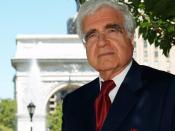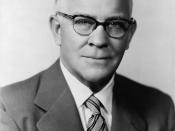Throughout the course of the drama, Willy Loman, a delusional salesman sinks lower into his depression and confusion, until he eventually ends his life. There has been much discussion on whether 'Death of a Salesman' is a tragedy, and if Willy is a tragic hero. Many critics question the supposedly tragic elements of the drama, citing Aristotle's definition of tragedy, and Shakespearean examples. Willy is often compared to King Lear, however it is often suggested that his misfortune pales in comparison to the well known tragic heroes. Arthur Miller considered Willy a tragic hero and as author, his opinions should be taken into account. Willy evokes pity and fear from the audience, and suffers due to his own fatal flaw, or hamartia, which Elia Kazan, the first director of 'Death of a Salesman', believed to be "neuroses and anxiety."
Literary critic, Professor Harold Bloom claims that Willy Loman is not a tragic hero by Aristotelian standards because he "does not fall from a great height, nor does he come to any realization of his complicity in the event."
Traditionally tragic heroes are men of high standing, princes, kings and generals, who fail and eventually die due to a fatal flaw, or hamartia. Aristotle would not have considered 'Death of a Salesman' a tragedy, because a tragedy must show a person who is worth serious attention. Willy Loman, an 'Everyman', is not worth the attention given him. However, as Miller himself pointed out, Shakespearean and Greek Tragedies were "enacted by royal beings but⦠apply to everyone in similar emotional situations." In the past stories had been written about characters of high standing, that were looked up to by the general public. Arthur Miller asked the important question, why? Why does a story have to be about someone who, buy...


